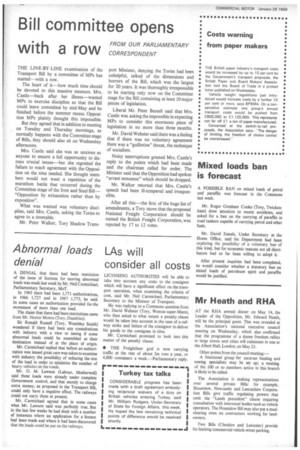Bill committee opens
Page 24

If you've noticed an error in this article please click here to report it so we can fix it.
With a row CORRESPONDENT THE LINE-BY-LINE examination of the Transport Bill by a committee of MPs has started—with a row.
The heart of it—how much time should be devoted to this massive measure. Mrs. Castle—back after her illness—wanted MPs to exercise discipline so that the Bill could leave committee by mid-May and be finished before the summer recess. Opposition MPs plainly thought this impossible.
But they agreed that in addition to meeting on Tuesday and Thursday mornings, as normally happens with the Committee stage of Bills, they should also sit on Wednesday afternoons.
Mrs. Castle said she was as anxious as anyone to ensure a full opportunity to discuss crucial issues—but she regretted the failure to reach agreement with the Opposition on the time needed. She thought members would not want a repetition of the marathon battle that occurred during the Committee stage of the Iron and Steel B ill— "Opposition by exhaustion rather than by exposition".
What was wanted was voluntary discipline, said Mrs. Castle, asking the Tories to agree to a timetable.
Mr. Peter Walker, Tory Shadow Trans port Minister, denying the Tories had been unhelpful, talked of the dimensions and horrors of the Bill, which was the largest for 20 years. It was thoroughly irresponsible to be starting only now on the Committee stage for the Bill containing at least 10 major pieces of legislation.
Liberal Mr. Peter Bessell said that Mrs. Castle was asking the impossible in expecting MPs to consider this enormous piece of legislation in no more than three months.
Mr. David Webster said there was a feeling that if there was no voluntary agreement there was a "guillotine" threat, the technique of socialism.
Noisy interruptions greeted Mrs. Castle's reply to the points which had been made and the chairman called for order. The Minister said that the Opposition had spoken "arrant nonsense" which should be dropped.
Mr. Walker retorted that Mrs. Castle's speech had been ill-tempered and irresponsible.
After all this—the first of the huge list of amendments, a Tory move that the proposed National Freight Corporation should be named the British Freight Corporation, was rejected by 17 to 12 votes.












































































































